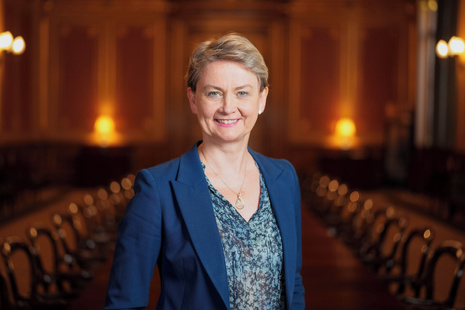Yvette Cooper’s net worth is estimated at £4 million to £5 million as of late 2025, according to reports.
Yvette Cooper has been a prominent figure in British politics for nearly three decades. In that time her public service, combined with other activities, has contributed to her personal financial profile. This article explores what is publicly known or estimated about her net worth as of mid‑November 2025, how her income streams and career developments contribute to that, and what factors might influence the accuracy of these estimates.
Estimating Yvette Cooper’s Net Worth
Publicly available estimates put Yvette Cooper’s net worth at around £4 million to £5 million. One recent figure suggests she has approximately £5 million in personal wealth. These figures reflect a combination of long‑term salary income from her role as a Member of Parliament (MP) and Cabinet minister, modest secondary income streams, and the value of her property and investments.
Career Income: The Foundation of Her Wealth
Cooper has been an MP since 1997, representing first the constituency of Pontefract & Castleford and from 2024 the newly‑configured seat of Pontefract, Castleford and Knottingley. Her base salary as an MP has risen steadily over this period, and having held ministerial and Cabinet roles (including Chief Secretary to the Treasury, Secretary of State for Work & Pensions, Home Secretary and, as of 2025, Foreign Secretary) she has benefited from higher grades of salary and allowances.
This long tenure in public office means that her cumulative gross earnings over nearly three decades have formed a substantial financial foundation. Additionally, she has written a book and received small royalties and payments for speaking engagements — though these secondary income streams are modest in comparison with her parliamentary salary.
Property Assets and Investments
In addition to salary income, Cooper and her husband (former Cabinet minister Ed Balls) have property holdings. Their real‑estate portfolio includes a primary residence in London (North London) and previous homes in their Northern constituency. These properties, combined with mortgage liabilities, help shape the net‑worth estimate. Property is a key asset category for many long‑serving politicians whose salary income alone would not typically yield multimillion‑pound net worths.
Investment holdings (such as pensions, stocks or other savings) are less visible publicly, but standard assumptions of long‑term saving and investment apply. Given her age (born 1969) and long career, it is reasonable to assume she possesses pension entitlements and private savings, though these are not publicly itemised in detail.
Secondary Income: Books and Speaking
While her primary financial base is her parliamentary work, Cooper has also earned income from writing and speaking. Registered interest records show she has received payments (for example under £1,000 for additional book‑sales in 2025), and while those payments alone are minor in the context of a multi‑million‑pound net worth estimate, they illustrate the presence of diversification.
Speaking engagements, panel appearances and book royalties often complement a politician’s income, especially when they have profile and name recognition. For Cooper, these income streams are likely supplementary rather than central to her wealth.
How Her Career Development Adds Up
When looking at her career chronology, certain milestones stand out for their financial significance. From her first election in 1997 to her promotion to Cabinet in 2008, she steadily increased both responsibilities and remuneration. Holding senior ministerial posts during the Gordon Brown government (2008–10) and later front‑bench positions in Opposition added to her profile and earning potential.
Since Labour’s return to government in 2024, Cooper’s appointment as Home Secretary and then Foreign Secretary in 2025 has presumably brought higher salary grades and greater allowances. While MPs’ salaries are public, allowances, expense‑entitlements, and senior‑minister pay vary and complicate exact net‑worth calculations.
Net‑Worth Estimate: Breakdown and Considerations
Based on the publicly cited £4 million‑£5 million range, how might that break down? A simplified breakdown might allocate:
-
Cumulative salary income (after tax) over ~28 years of MP service plus ministerial allowances — a core component.
-
Property assets (primary residence and possibly other property holdings) minus mortgage or loan liabilities.
-
Pension entitlements and private savings/investments built over the career span.
-
Secondary income from book royalties and speaking engagements.
Factors that could pull the estimate down include mortgage or property debt, campaign costs, tax liabilities, and private spending. Factors pushing it up include property value increases (especially in London), pension growth, and any un‑publicised investments.
Transparent Limits and Uncertainties
Crucially, net‑worth figures for politicians are estimates, not certainties. Many details — private investments, precise mortgage balance, pension value, and the value of non‑public assets — are not disclosed in full.
Also, politicians’ net worth can fluctuate with property markets and financial markets. For instance, a rise or fall in London‑property values will affect net worth materially. Similarly, changes in pension valuation or savings performance matter.
How Her Net‑Worth Compares
In the British context, a net worth of around £4–5 million places Cooper among the more financially comfortable MPs, but not among the ultra‑wealthy. Many long‑serving MPs accumulate modest wealth relative to large private‑sector figures, given public‑sector remuneration and regulation.
Comparatively, high‑profile long‑serving politicians who combine public office with media, speaking or entrepreneurship can achieve significantly higher net worths. Cooper’s net worth reflects her long service and property assets more than large business entrepreneurship or corporate board income.
What the Public Record Shows
Official parliamentary disclosures provide some details of income and registered interests but stop short of full asset‑valuations. For example, registers list book payments and donations for her office staffing, but do not itemise property valuations or pensions. In essence, the official record gives partial transparency but requires assumptions for full net‑worth calculations.
For her property holdings, the public record indicates a London home purchased in the past decade and previous homes in the north. The average property‑appreciation rates in the London area are high — which supports why property assets form a significant portion of the net‑worth estimate.
Personal Life and Financial Household
Cooper is married to Ed Balls, himself a former minister and Shadow Chancellor. Household finances thus include both partners’ income, assets and tax obligations. Shared property and investments mean that some of the net‑worth estimate may effectively reflect joint household wealth rather than purely independent net worth. Nonetheless the figure of around £4–5 million is often attributed to her individually (or as part of the household).
The couple has three children and maintain homes both in London and in the North (their constituency region). Their dual‑region footprint may enhance the value of property holdings. Their expenditure pattern, income dynamics and asset accumulation reflect a combination of public service salaries, prudent property investment and standard middle‑to‑upper‑income professional savings behaviour.
Why This Matters
Understanding the net worth of senior politicians helps inform public discussion about access, independence and the relationships between public office and private financial standing. While income in public office is transparent, asset values and net worth are less so. For a career politician like Cooper, her net‑worth estimate of around £5 million sheds light on the financial outcomes of long‑term parliamentary and ministerial service combined with property investment.
It also illustrates that entering politics can lead to comfortable (though not necessarily extravagant) personal wealth — especially when paired with property acquisition in desirable areas and long service. Yet it remains modest compared to many business magnates, meaning that political office remains distinct in its financial dynamics.
Looking Ahead
Given current estimates and her active political career, Cooper’s net worth may continue to grow. Factors likely to drive this growth include: property appreciation (especially London), further income from books or public appearances (if she chooses), and pension accumulation. Should she move into paid non‑parliamentary roles in future, this could also increase her personal assets. On the flip side, any significant financial liabilities, changes in property market conditions or changes to pension rules could affect the net‑worth trajectory.
As of 11 November 2025, the estimate around £4‑5 million is the most credible ballpark figure given the available data. Future asset disclosures, or large shifts in property or investment performance, may cause revisions.




